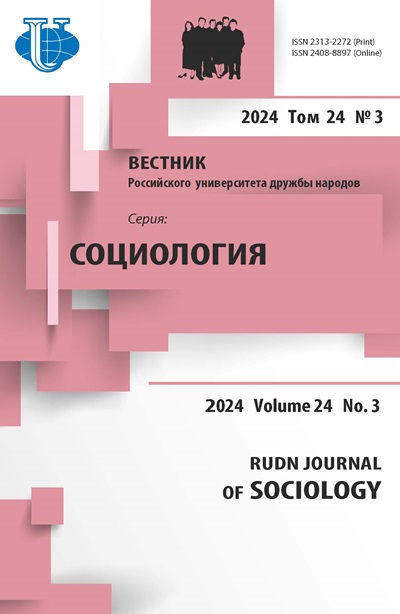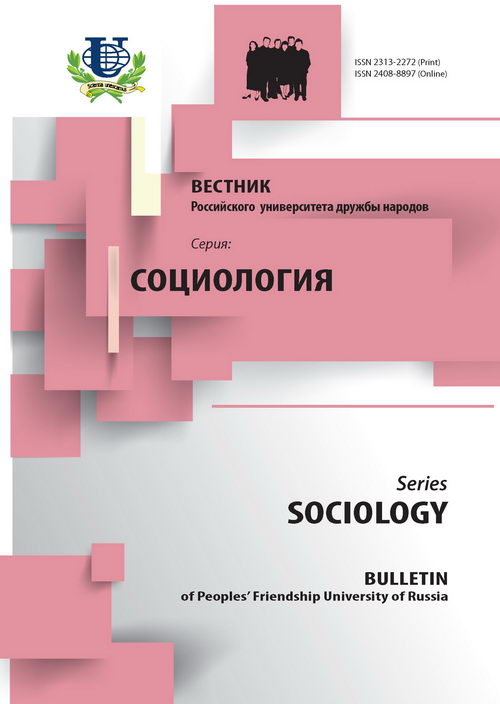Теоретические и эмпирические исследования профессиональной карьеры: перспективы интеграции на основе теории П. Бурдье
- Авторы: Сорокин П.С.1
-
Учреждения:
- Национальный исследовательский университет«Высшая школа экономики»
- Выпуск: № 1 (2012)
- Страницы: 5-15
- Раздел: Статьи
- URL: https://journals.rudn.ru/sociology/article/view/6425
Цитировать
Полный текст
Аннотация
В работе рассматриваются основные подходы к трактовке профессиональной карьеры, а также направления эмпирических исследований факторов карьерного продвижения. Показана низкая степень согласованности между попытками теоретической концептуализации карьеры в рамках общесоциологических теорий и эмпирическими работами в данной области. Анализируются наиболее перспективные направления дальнейшего исследования карьерной проблематики в контексте основных положений теории социального пространства П. Бурдье. В первую очередь речь идет о разработке понятия «карьерное поле» и связанного с ним понятия «карьерный капитал».
Ключевые слова
Об авторах
Павел Сергеевич Сорокин
Национальный исследовательский университет«Высшая школа экономики»
Автор, ответственный за переписку.
Email: pssorokin@mail.ru
Кафедра управления человеческими ресурсамиФакультет менеджмента; Национальный исследовательский университет«Высшая школа экономики»
Список литературы
- Заславская Т.И. Структура российского общества через призму трансформационного процесса // Мониторинг общественного мнения: экономические и социальные перемены. - 2002. - № 4. - С. 7-13.
- Кибанов А.Я., Дуркова И.Б. Управление персоналом организации. Стратегия, маркетинг, интернационализация. - М.: Инфра-М, 2011.
- Шматко Н.А. Введение в социоанализ Пьера Бурдье. Предисловие к книге П. Бурдье «Социологии политики». - М.: Socio-Logos, 1993.
- Эфендиев А.Г., Балабанова Е.С., Гоголева А.С. Социальная организация российского бизнеса сквозь призму социальных механизмов трудоустройства // Мир России: социология, этнология. - 2010. - Т. XIX. - № 4. - С. 69-103.
- Эфендиев А.Г., Балабанова Е.С., Сорокин П.С. Карьера сотрудников российских бизнес-организаций как социальное явление: опыт эмпирического исследования // Мир России. - 2011. - № 4.
- Эфендиев А.Г., Ребров А.В. Деятельность служб УЧР и экономическая эффективность: эмпирическое исследование в российских компаниях // Современный менеджмент: проблемы, гипотезы, исследования / Под ред. М.Ю. Шерешевой. - М., 2011.
- Arthur M.B., Hall D.T., Lawrence, B.S.: Generating new directions in career theory: the case for a transdisciplinary approach // Arthur M.B., Hall D.T., Lawrence B.S. (eds.) Handbook of Career Theory, pp. 7-25. Cambridge University Press, Cambridge (1989).
- Bourdieu P. (1977) Outline of a Theory of Practice. Cambridge, MA: Cambridge University Press.
- Bourdieu P. (1986) The forms of capital. In: Richardson JG (ed.) Handbook of Theory and Research for the Sociology of Education. New York: Greenwood, 241-258.
- Bourdieu P. (1990) The Logic of Practice. Stanford, CA: Stanford University Press.
- Bird A. Careers as repositories of knowledge: considerations for boundaryless careers. In: Arthur M.B., Rousseau D.M. (eds.) The Boundaryless Career: a New Employment Principle for a New Organizational Era, pp. 150-168. Oxford University Press, Oxford (1996).
- Brousseau K.L., Driver M.J., Eneroth K., Larsson R. Career pandemonium: Realigning organizations and individuals // Academy of Management Executive, 1996. Vol. 10. N 4. p. 52-66.
- Castilla E. Gender, Race, and Meritocracy in Organizational Careers // American Journal of Sociology, 2008, Vol. 113, Issue 6. p. 1479-1526.
- Chudzikowski K., Mayrhofer W. 2011. In search of the blue flower? Grand social theories and career research: The case of Bourdieu's theory of practice. Human Relations, 64(1): 14-32
- Coleman J.S. (1990) Foundations of Social Theory. Cambridge, MA: Cambridge University Press.
- Collin A. Career // Greenhaus J.H., Callanan G.A. (eds.) Encyclopedia of Career Development, pp. 60-63. Sage Publications Inc., Thousand Oaks, CA (2006).
- Foster L.W., Kolinko T. Choosing. To Be a Managerial Woman: An Examination of Individual Variables and Career Choice // Sex roles. 1979. Vol. 5, Issue 5. p. 627-634.
- Giddens A. (1984) The Constitution of Society. Outline of the Theory of Structuration. Cambridge: Polity Press.
- Granrose C.S., Portwood J.D. Matching individual career plans and organizational career management // Academy of Management Journal. 1987. Vol. 30. Issue 4. p. 699-720.
- Gunz H. Organizational logics of managerial careers // Organizational studies. 1988. Vol. 9. Issue 4. p. 529-554.
- Gunz H., Mayrhofer W. Re-conceptualizing career success: a contextual approach. Zeitschrift für ArbeitsmarktForschung, 2011. 43(3): p. 251-260.
- Hughes E.C. Men and Their Work. The Free Press, Glencoe, Ill (1958).
- Iellatchitch A., Mayrhofer W., Meyer M. (2003). Career fields: a small step towards a grand career theory? // International Journal of Human Resource Management, Vol. 14, August: 728-750.
- Juntunen C., Cline K. Culture and Self in Career Development: Working With American Indians // Journal of Career Development. 2010. Vol. 37. Issue 1. p. 391-410.
- Khapova S.N., Arthur M.B. Interdisciplinary approaches to contemporary career studies // Human Relations. 2011. Vol. 64. Issue 1. p. 3-17.
- Latack J.C. Organizational Restructuring and Career Management: From Outplacement and Survival to Inplacement // Research in personnel and human resources management. 1990. Vol. 8. pp. 109-139.
- Lips-Wiersma M., Hall D.T. Organizational career development is not dead: a case study on managing the new career during organizational change. Journal of Organizational Behavior, Sep2007, Vol. 28 Issue 6, p771-792.
- Lounsbury M., Ventresca M. (2003) The New Structuralism in Organizational Theory. Organization 10(3): P. 457-480.
- Luhmann N. (1995) Social Systems. Stanford, CA: Stanford University Press.
- Mills C.W. (1959) The Sociological Imagination. New York: Oxford University Press.
- Nicholson N., West M.: Transitions, work histories and careers // Arthur M.B., Hall D.T., Lawrence B.S. (eds.) Handbook of career theory, pp. 181-201. Cambridge University Press, Cambridge, England (1989).
- Özbilgin M., Tatti A. (2005). Book review Essay: Understanding Bourdieu's contribution to organization and management studies // Academy of Management Review, 30/4: 855-877.
- Pazy A. Sex Differences in Responsiveness to Organizational Career Management // Human Resource Management. 1987. Vol. 26. Issue 2. p. 243-256.
- Pfeffer J. Toward an examination of stratification in organizations // Administrative Science Quarterly. 1977. Vol. 22. Issue 4. p. 553-567
- Portwood J.D., Granrose C.S. Organizational Career Management Programs: What's Available? What's Effective? // Human Resource Planning. 1986. Vol. 9. Issue 3. p. 107-119
- Schein E.H. Career Theory and Research: Some Issues for the Future // Derr C.B. (ed.) Work, Family, and the Career: New Frontiers in Theory and Research, pp. 357-365. Praeger, New York (1980).
- Schein E.H. Culture as an Environmental Context for Careers // Journal of Occupational Behavior. 1984. Vol. 5. Issue 1. p. 71-81.
- Snipp C.M. Working-Class Differentiation and Men's Career Mobility // British Journal of Sociology. 1985. Vol. 36. Issue 3. pp. 354-373.
- Sturges J., Conway N., Guest D., Liefooghe A. Managing the Career Deal: The Psychological Contract as a Framework for Understanding Career Management, Organizational Commitment and Work Behavior // Journal of Organizational Behavior. 2005, Vol. 26. Issue 7. p. 821-838.
- Tomaskovic-Devey D., Thomas M., Johnson K. Race and the Accumulation of Human Capital across the Career: A Theoretical Model and Fixed-Effects Application // American Journal of Sociology. 2005. Vol. 111. Issue 1. p. 58-89.
- Van der Heijden, Beatrice I.J.M. Individual Career Initiatives and their Influence upon Professional Expertise Development throughout the Career // International Journal of Training & Development. 2002. Vol. 6. Issue 2. pp. 54-80.
- Van Maanen J., Katz R. Individuals and their Careers: Some Temporal Considerations for Work Satisfaction // Personnel Psychology. 1976. Vol. 29. Issue 4. p. 601-616.
- Vardi Y., Hammer T.H. Intraorganizational Mobility and Career Perceptions among Rank and File Employees in Different Technologies // Academy of Management Journal. 1977. Vol. 20. N 4. P. 622-634.
- Walder A.G. Career Mobility and the Communist Political Order // American Sociological Review. 1995. Vol. 60. Issue 3. p. 309-328.
- Walder A.G., Li B., Treiman D.J. Politics and Life Chances in a State Socialist Regime: Dual Career Paths into the Urban Chinese Elite, 1949-1996 // American Sociological Review, 2000, Vol. 65. Issue 2. p. 191-209.
- Zhao W., Zhou X. Chinese Organizations in Transition: Changing Promotion Patterns in the Reform Era // Organization Science. 2004. Vol. 15, Issue 2. p. 186-199.













